Community, People & Partnerships
Come and learn from community and academic experts in their fields in the Hawaiian and Indigenous Health and Healing programs. Explore bios of our graduates and keep checking back for internship opportunities.
Hawaiian & Indigenous Health & Healing Faculty

Kauʻi Baumhofer Merritt, ScD, MPH, MA


Dr. Merritt was raised in the ahupua‘a of ‘Aiea in the moku of ‘Ewa and lives in her family home that was built by her father and uncles. The ‘āina that feeds her spans from the mountains of ‘Aiea ridge to the waters of Pu‘uloa where she enjoys hiking on ‘Aiea Loop Trail and swimming at Fort Kamehameha Beach with her husband and their son. She walks in the professional footsteps of her mother, a social worker and pioneering supporter of culturally-based substance misuse and mental health treatment programs.
At the University of Hawai‘i-West O‘ahu, she is an Associate Professor of Indigenous Health Science. Her current work draws on concepts and theories from medicine, anthropology, sociology, psychology, and public health to reduce Native Hawaiian health inequities within a social justice framework. Her work addresses how social and cultural environments are embodied within individuals and shows how they manifest as the unequal distribution of disease between populations. She is specifically interested in the prevention of cardiometabolic disease through community interventions that aim to address the cultural, historical, and social determinants of disease.
Dr. Merritt was a Queen’s Health System Health Equity Postdoctoral Fellow in the Department of Native Hawaiian Health at the University of Hawai’i John A. Burns School of Medicine from 2017-2019. She earned a Doctor of Science degree in Society, and Human Development, and Health in the Department of Social and Behavioral Sciences at the Harvard T. H. Chan School of Public Health, a Master of Public Health in Health Behavior and Health Education from the University of Michigan, and a Master of Arts in Pacific Islands Studies from the University of Hawai‘i at Mānoa.
She is also the recipient of the Harvard University Native American Program’s 1665 Caleb Cheeshateaumuck Pre-Doctoral Fellowship, a Certificate of Distinction in Teaching from the Harvard University Derek Bok Center for Teaching and Learning, and the Dr. Fang-Ching Sun Memorial Award for Work with Vulnerable Populations from the T. H. Chan School of Public Health.
Recent intra and extramural funding awards include: “Indigenous Knowledge Education (IKE) and the Rapid Remote Learning Pivot” (Spencer Foundation #202100070) and “Impact of neighborhood characteristics, social isolation, and diet quality on chronic inflammation” (Center for Pacific Innovations, Knowledge and Opportunities Program NIH NIGMS U54GM138062 Project #6111676).
Dr. Kauʻi Baumhofer Merritt
Assistant Professor of Indigenous Health Sciences & HIHH Faculty Contact
nicolekb@hawaii.edu
Courses Taught:
HLTH 204 Introduction to Native Hawaiian and Indigenous Health and Healing
HLTH 205 Hawaiian Ways of Healing
HLTH 360 Health Disparities and Pacific Peoples
HLTH 450 Theories of Wellness and Disease: Hawai’i and Beyond
HLTH 460 Biostatistics
HLTH 470 Research Methods for Indigenous Well-Being
PUBA 104 Introduction to Community Health
PUBA 307 Community Health Analysis
PUBA 334 Intersection of Community and Global Health
PUBA 368 Foundations of Community Health
Manulani Meyer, PhD, MA
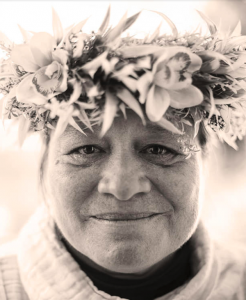 Manulani Aluli Meyer is the fifth daughter of Emma Aluli and Harry Meyer who grew up on the sands of Mokapu and Kailua beach on the island of O’ahu and along the rainy shoreline of Hilo Palikū. The Aluli ʻohana is a large and diverse group of scholar-activists dedicated to Hawaiian education, restorative justice, land reclamation, ohana healing practices, cultural revitalization, arts education, prison reform, transformational economics, food sovereignty, and Hawaiian music. Manu works in the field of indigenous epistemology and its role in world-wide awakening.
Manulani Aluli Meyer is the fifth daughter of Emma Aluli and Harry Meyer who grew up on the sands of Mokapu and Kailua beach on the island of O’ahu and along the rainy shoreline of Hilo Palikū. The Aluli ʻohana is a large and diverse group of scholar-activists dedicated to Hawaiian education, restorative justice, land reclamation, ohana healing practices, cultural revitalization, arts education, prison reform, transformational economics, food sovereignty, and Hawaiian music. Manu works in the field of indigenous epistemology and its role in world-wide awakening.
Aluli-Meyer obtained her doctorate in Philosophy of Education from Harvard (Ed.D. 1998). Her background is in wilderness education, coaching, and experiential learning. She has been an Instructor for Outward Bound, Hawaii Bound, a coach for Special Olympics in three states, and a passionate advocate for the Hawaiian Charter School movement. Dr. Aluli Meyer has been an Associate Professor of Education at UH Hilo and spent five years in New Zealand as the lead designer/teacher for He Waka Hiringa, an innovative and accredited Masters of Applied Indigenous Knowledge at Te Wānanga o Aotearoa. Dr. Aluli-Meyer is currently working at UH West O’ahu to help contextualize higher learning within a Hawaiian worldview. Manu is a wahine kalai pohaku (stone carver) along with lei ano and lei hala maker (seed leis). She is dedicated to Indigenous food security and works to bring the coconut back into daily use. She is also a 30+ year practitioner of hoʻoponopono who appreciates and learns from the purpose of conflict.
Dr. Manulani Meyer
Konohiki for Kūlana o Kapōlei & Associate Specialist
manulani@hawaii.edu
Courses Taught:
Nohona Hawai’i
HLTH 300 Ho’oponopono Novice Level A
HLTH 400 Ho’oponopono Novice Level B
Ms. Katherine Burke, PhD(c), MPH
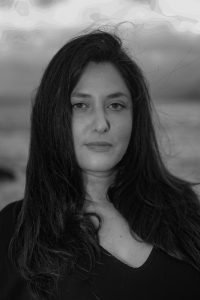 Ms. Katherine Burke, PhD(c), MPH is a lecturer in Hawaiian and Indigenous Health and Healing and Director of the Māpuna Lab at the University of Hawaiʻi – West Oʻahu. She currently teaches courses in the Bachelorʻs of Applied Science in Hawaiian and Indigenous Healing program. Her research areas include social determinants of health, health equity, cultural safety, social justice and ancestral connection which she pursues as the Director of the Māpuna Lab in serving the Alcohol and Drug Abuse Division of the Behavioral Health Administration of the Hawaiʻi State Department of Health and the State Department of Corrections & Rehabilitation. An evaluator by trade she holds a bachelor’s degree in Neuroscience and Behavior from Mount Holyoke College and a master’s degree in public health, social and behavioral health sciences from the University of Hawaiʻi at Mānoa where she is currently pursuing a doctoral degree in Community-Based and Translational Research and is currently at the ʻAll But Dissertationʻ (ABD) candidacy level. Burke is of Hellenic (Peloponnese), Irish (County Mayo), French (Île-de-France), Bavarian and Romanche ancestry and was given a love for the role of plants in public health by her grandfather and her great grandmother. As a settler transplant she is passionate about our plant ancestors and how we can overcome plant blindness by connecting with our genealogy and caring for the land and water system that feed us through personal transformation on the ʻili ʻāina of ʻOuaua and Māluawai in the ahupuaʻa of Kalihilihiolaumiha and aloha ʻāina leadership at Hoʻoulu ‘Āina.
Ms. Katherine Burke, PhD(c), MPH is a lecturer in Hawaiian and Indigenous Health and Healing and Director of the Māpuna Lab at the University of Hawaiʻi – West Oʻahu. She currently teaches courses in the Bachelorʻs of Applied Science in Hawaiian and Indigenous Healing program. Her research areas include social determinants of health, health equity, cultural safety, social justice and ancestral connection which she pursues as the Director of the Māpuna Lab in serving the Alcohol and Drug Abuse Division of the Behavioral Health Administration of the Hawaiʻi State Department of Health and the State Department of Corrections & Rehabilitation. An evaluator by trade she holds a bachelor’s degree in Neuroscience and Behavior from Mount Holyoke College and a master’s degree in public health, social and behavioral health sciences from the University of Hawaiʻi at Mānoa where she is currently pursuing a doctoral degree in Community-Based and Translational Research and is currently at the ʻAll But Dissertationʻ (ABD) candidacy level. Burke is of Hellenic (Peloponnese), Irish (County Mayo), French (Île-de-France), Bavarian and Romanche ancestry and was given a love for the role of plants in public health by her grandfather and her great grandmother. As a settler transplant she is passionate about our plant ancestors and how we can overcome plant blindness by connecting with our genealogy and caring for the land and water system that feed us through personal transformation on the ʻili ʻāina of ʻOuaua and Māluawai in the ahupuaʻa of Kalihilihiolaumiha and aloha ʻāina leadership at Hoʻoulu ‘Āina.
Katherine Burke
Lecturer, HIHH, Mathematics, Natural, and Health Sciences Division
Director, Māpuna Lab
Courses Taught:
HLTH 204 Introduction to Hawaiian and Indigenous Health and Healing
HLTH 470 Research Methods for Indigenous Well-Being
Other Faculty
Lomilomi Instructor
Courses Taught:
HLTH 205 Hawaiian Ways of Healing
HLTH 310 Lomilomi Novice Level A
HLTH 410 Lomilomi Novice Level B
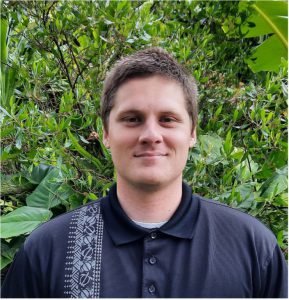 From Wahiawā on the island of O`ahu. Kōnane graduated with a masters of arts in `Ike Hawai`i(Hawaiian Studies), from the University of Hawai`i at Mānoa in 2021. His thesis was “Lā`au Lapa`au: A Study of Anaphylaxis.” Kōnane has been practicing lā`au lapa`au (Hawaiian herbal medicine) since 2015. He learned and continues to study under Kumu Keoki Kīkaha Pai Baclayon who was taught by Kahuna Lā`au Lapa`au Levon Ohai. Kōnane started his lomilomi journey in 2018 learning and continuing to study under Enrick Ortiz, Jr. who was taught by Alva Andrews. He graduated from Hawaii Healing Arts College and Message Professionals, and passed the massage state exam in 2021. Kōnane was also Lapa`au Kāko`o in the Ma`iola Services Dept. at the Waimānalo Health Center for four years from 2018 – 2022. Where he cared for the medicinal plants, made medicine for patients, and helped teach lā`au lapa`au.
From Wahiawā on the island of O`ahu. Kōnane graduated with a masters of arts in `Ike Hawai`i(Hawaiian Studies), from the University of Hawai`i at Mānoa in 2021. His thesis was “Lā`au Lapa`au: A Study of Anaphylaxis.” Kōnane has been practicing lā`au lapa`au (Hawaiian herbal medicine) since 2015. He learned and continues to study under Kumu Keoki Kīkaha Pai Baclayon who was taught by Kahuna Lā`au Lapa`au Levon Ohai. Kōnane started his lomilomi journey in 2018 learning and continuing to study under Enrick Ortiz, Jr. who was taught by Alva Andrews. He graduated from Hawaii Healing Arts College and Message Professionals, and passed the massage state exam in 2021. Kōnane was also Lapa`au Kāko`o in the Ma`iola Services Dept. at the Waimānalo Health Center for four years from 2018 – 2022. Where he cared for the medicinal plants, made medicine for patients, and helped teach lā`au lapa`au.
La’au lapa’au Instructor
Courses Taught:
HLTH 305 La’au Lapa’au Novice Level A
HLTH 405 La’au Lapa’au Novice Level B
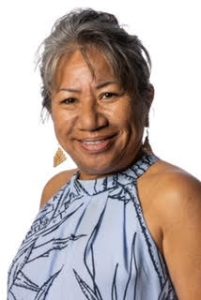
Rachel “Lahela” Kruse, MSW, CSAC, is a Cultural Practitioner, currently residing on Hawai’i Island who works closely with those dealing with substance abuse and addiction using traditional healing methods of Ho’oku’u’ka hewa for the individual then implementing Ho’oponopono for the family. Lahela is immersed in a cultural-based approach in working with haumana (students/clients) to get to the core of the individual’s trauma by looking at their past so they can face their present and move forward to a healthy and thriving future. She recieved her cultural immersion training from 2 prominent Kupuna (elders) Aunty Pearl Ulunuiokamamalu Kanaka’ole Garmon and Aunty Lynette Kahekili Kahopuiki Paglinawan. Lahela recieved her Bachelor’s degree in Psychology from the University of Hawai’i, Hilo then obtaining her Master’s degree in Social Work from the University of Hawai’i at Manoa. Lahela has been working for 20+ years with youth, adults, and comunity dealing with the struggles of substance abuse.
Ho’oponopono Instructor
Courses Taught
HLTH 300 Ho’oponopono Novice Level A
HLTH 400 Ho’oponopono Novice Level B
Lomilomi Instructor
Courses Taught:
HLTH 205 Hawaiian Ways of Healing
HLTH 310 Lomilomi Novice Level A
HLTH 410 Lomilomi Novice Level B

Tasia Yamamura is a lecturer in Indigenous Health Sciences at the University of
Hawaiʻi – West Oʻahu. Her research interests include the holistic health benefits of land-based education, community health, cultural identity, and indigenous food systems. She holds an MA in Native Hawaiian and Indigenous Health from UH Mānoa and currently manages UH West Oʻahu’s Student Organic Garden. Past work experiences include the Roots Program at Kōkua Kalihi Valley Comprehensive Health Center and MAʻO Organic Farms.
Epidemiology Instructor and Garden Manager
Courses Taught:
HLTH 360 Health Disparities and Pacific Peoples
 Perpetuate the teaching of Mary Kawena Pukaʻi and ancestral wisdom in Hawaiian health, wellness, and healing through hoʻoponopono; other related values, beliefs, and practices with individuals, families; to promote recovering and living aloha, pono, and lokahi for today.
Perpetuate the teaching of Mary Kawena Pukaʻi and ancestral wisdom in Hawaiian health, wellness, and healing through hoʻoponopono; other related values, beliefs, and practices with individuals, families; to promote recovering and living aloha, pono, and lokahi for today.
I have knowledge of Hawaiian beliefs and practices as mentored by my moʻokuauhau Kaopuiki/Naonealaʻa/Kaikainahaole; Mary Kawena Pukuʻi from 1966 to 1972; and 50 years of living hoʻoponopono as a way of life. I have practiced hoʻoponopono for over 45 years.
In 1966 I began my professional career in social work at the Queen Liliuokalani Childrenʻs Center first as a practitioner, then as a Research Practitioner. The Hoʻoponopono Project #2 to test the viability of hoʻoponopono with families in the 20th century. The intervention with Hawaiian families was impactful with dramatic results and was found to be transferable in empowering parents to do hoʻoponopono within their own families. Over time moved from field worker in Honolulu, and Nanakuli to researcher, and then to Unit Manager of a 7 acre facility in Punaluʻu supervising 11 staff providing social services to Hawaiian Children and their families living in the Kahaluʻu to Waialua area.
Headed the Native Hawaiian Culture and Arts Program, a POS granting program for the recovery of lost and or at risk of loss Hawaiian traditions at the Bishop Museum for five years. Taught in the University of Hawaii system for 20 years first at Windward Community College, UH Manoa MBT School of Social Work at the Bachelor and Masterʻs level and currently at UH West Oʻahu in Kapolei.
Aunty Lynette Paglinawan
Loea Hoʻoponopono & UHWO Kupuna-in-Residence
lynette2@hawaii.edu
Courses Taught:
Nohona Hawai’i
HLTH 205 Hawaiian Ways of Healing
HLTH 300 Ho’oponopono Novice Level A
HLTH 400 Ho’oponopono Novice Level B

Dr. Emily K. Makahi is a lecturer in Hawaiian & Indigenous Health & Healing at the University of Hawaiʻi – West Oʻahu. She brings her extensive background in Native Hawaiian health research and cultural practice integration to the classroom, teaching students about indigenous approaches to wellbeing. Currently serving as Principal Investigator at the Wai’anae Coast Comprehensive Health Center, her community-based research examines the role of Mana exchange in optimizing Native Hawaiian health, developing indigenous methodologies for evaluating spiritual determinants of health outcomes.
Her approach to teaching and research is deeply informed by training in Ho’oponopono under respected cultural experts Lynette and Richard Likeke Paglinawan, and hula traditions from Kumu Hula Ka’ilihiwa Vaughan-Darval and Master Weaver, Kumu Ipolani Vaughan. This cultural grounding, combined with her academic preparation enables her to bridge indigenous wisdom with contemporary health practices in both teaching and research.
Dr. Emily K. Makahi
Graduates
Moanalani Jones-Wong, BAS
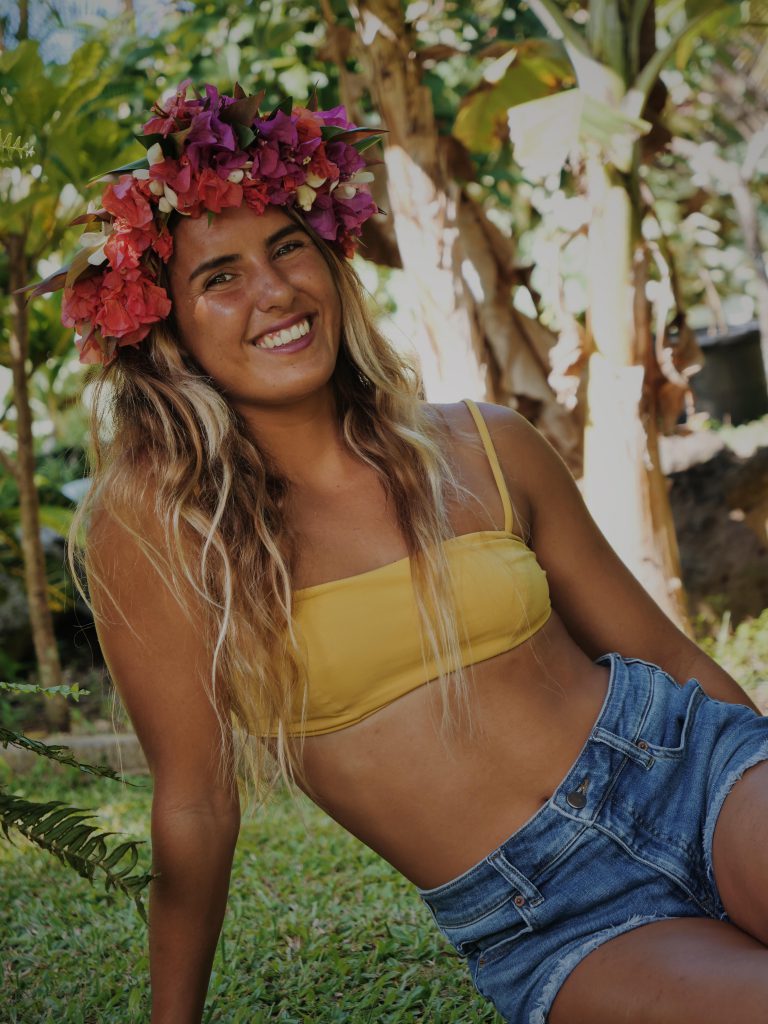
BAS-HIHH, Spring 2021
Thesis title: Surfing – More than a sport
Christine Park, PhD, LMHC, NCC
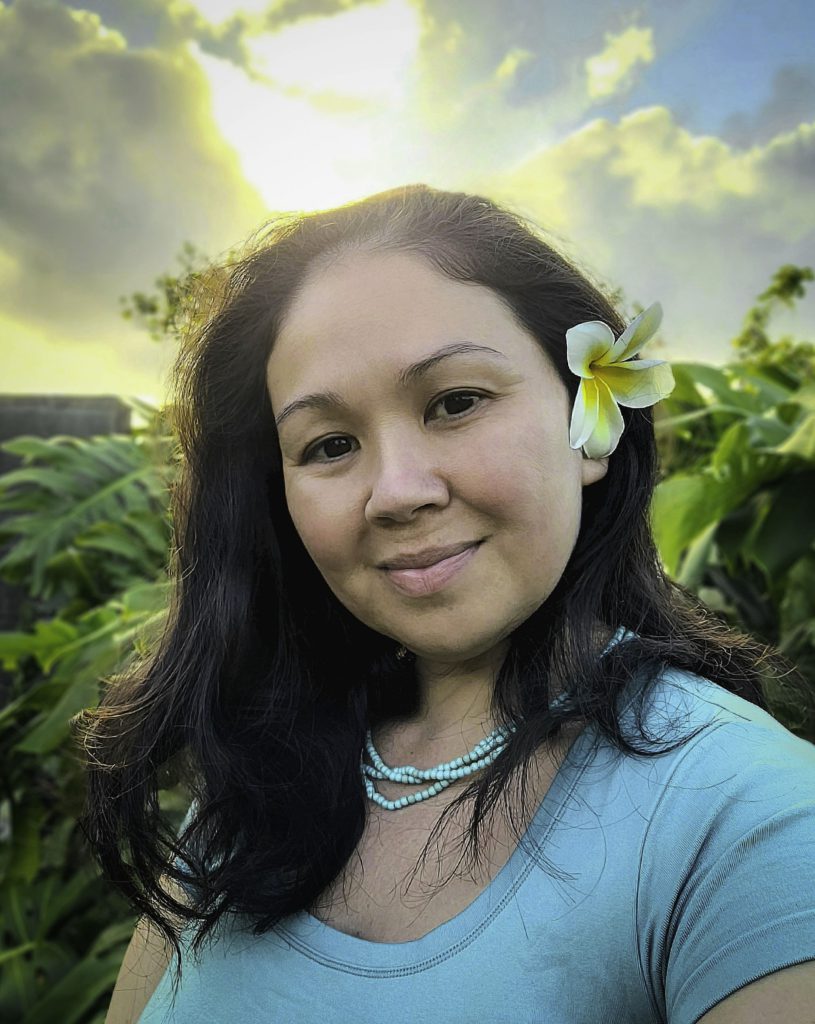
CERT-HIHH, Fall 2022
The HIHH certificate program is an amazing opportunity to learn about Native Hawaiian well-being and healing modalities. The program provides a nice balance of historical and contemporary content, and the information in the courses is essential and relevant. As someone who was born and raised, and who lives and works in Hawaiʻi, this program has helped me to be a better provider in our community. This certificate program was the best investment I made and furthered my education and professional competence in the fields of mental health and education.
Kiley Garcia, BAS, CNA
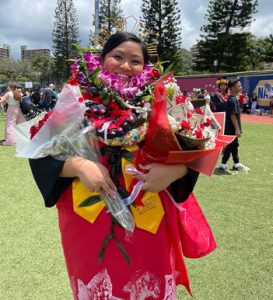 CERT-HIHH, Spring 2023
CERT-HIHH, Spring 2023
The HIHH certificate program contained information about the Native Hawaiian pillars of health, well-being, addressed how historical and current issues affect our NH and indigenous populations, and opened opportunities for discussion of how we, as a community, can work to address these issues. The program not only provided a deep dive into NH traditions/issues, but also allowed me to delve into my mo’okū’auhau (genealogy) as a first-generation Filipino-American college student. Overall, the program allowed me to establish connections within myself and my family, it gave me a sense of belonging in both my culture and the community I grew up in, and further solidified my desire to provide for these communities in the future. As an aspiring healthcare provider, I expect to use my education in Native Hawaiian health, cultural medicinal preferences, and history to practice cultural competence, compassion, and ultimately give back to the communities that nourished and cared for me too.
Kaela Cachola-Tom, BAS
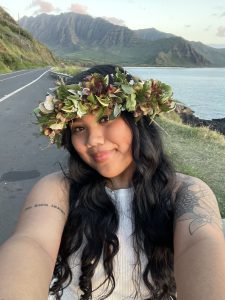 BAS-HIHH, Fall 2023
BAS-HIHH, Fall 2023
Thesis title: Addiction Intervention Native Approach (‘ĀINA)
Aloha mai kākou! My name is Kaela Cachola-Tom! I recently graduated with my bachelor’s in Hawaiian and Indigenous Health and Healing in the spring of 2023. My journey started in 2019 as a senior who graduated from Moanalua High School. Like most, I had no clear idea of what I wanted to major in. In my freshman year, I started off as a business major with a concentration in hospitality in tourism, It was interesting but I didnʻt feel fulfilled. A year later, COVID-19 hit. One day, I had a random feeling to go on the UHWO website and explore the different majors. I scrolled for two minutes and came across HIHH. The moment I read the major description, I instantly felt called to switch! It was a feeling I will never forget. I felt it in my naʻau (gut) that this was my calling. From the moment I switched, I received so many hōʻailonaʻs (signs) from my kupuna (ancestors) that I was on the right path, and to this day I still receive many of them! In HIHH, I felt fulfilled. I’ve met so many awesome people and made lifelong connections with those who are interested in the same things as me. Switching to HIHH was the best decision I’ve made. HIHH is really interesting because we learn about the historical, political, social, and environmental factors that contribute to the many health disparities that Native Hawaiians and Pacific Islanders face. With this understanding, we are able to see the connection and much-needed implementation of indigenous healing practices. It was really rewarding to learn from brilliant Kumus (teachers) who were very knowledgeable in hoʻoponopono, lāʻau lapaʻau, and lomilomi. I accredit the connections and relationships I have now, to HIHH. For my senior project, I focused on using ʻāina (the land) as a healing modality to heal Native Hawaiians suffering from substance misuse. HIHH opened many doors of exploration for me for my future. Currently, I work for KUPU, a non-profit organization that focuses on conservation, sustainability, and environmental education with a focus on ʻāina based learning. I work in the DOE high schools to provide teaching resources that allow teachers to embed Hawaiian culture and values in their curriculum. To make the connection about what I teach in the classroom, I provide hands-on experience by bringing the students to ʻāina/conservation sites for field trips, as it highlights the importance of mālama and aloha ʻāina (Taking care and loving the land). This is in hopes of inspiring the next generation of ʻāina stewards. In the future, I hope to work in the field of substance misuse prevention for Native Hawaiian youth by incorporating ʻāina as a way of healing. With so much aloha, I canʻt thank all the Kumuʻs enough who have shared their ʻike (knowledge) with me over the past 4 years. I can’t wait to dedicate my life to healing the lāhui (Hawaiian nation)3
Kawehi Gordon, BAS
BAS-HIHH, Spring 2024
Alana Grace, BAS
BAS-HIHH, Spring 2024
Tatum Leslie, BAS
B AS-HIHH, Spring 2024
AS-HIHH, Spring 2024
Tatum Leialoha Leslie is a Native Hawaiian storyteller and food systems practitioner from the Moku of ʻEwa. She currentlyresides in the rich valley of Lualualei, where Kaiaulu blows and the Paʻu o Hiʻiaka grows. She has abaccalaureate in Applied Science with a concentration in Hawaiian andIndigenous Health and Healing (HIHH) from UH-West Oʻahu (UHWO).
Leialoha initially attended UH-Mānoa in 2017 for an engineering degree, but the pandemic later influenced her decision to transfer to UHWO, hoping to find a sense of community, learn how to heal, and deepen her connection to ʻāina. The HIHH program explored both Indigenous and Western perspectives of health and encouraged students to embrace vulnerability. Honorable mentions from other programs include SCFS 335 Politics of Food, HPST 383 Aloha ʻĀina Discourse, Movements, Concepts, and HAW 101 Intro to ʻŌlelo Hawaiʻi. One takeaway she had from the program was the relationships she developed along the way and ʻauamo kuleana.
The program ignited her passion for food systems, and during her studies, she also worked as an organic farmer at MAʻO Organic Farms. Leialoha plans to continue her academic journey by pursuing a graduate degree in a STEM-related field next fall.
Halia'aloha Maele-Ramos, BAS
BAS-HIHH, Spring 2024
Danielle Kapi'olani Larin, MA, LMFT, ACCTS, HTS
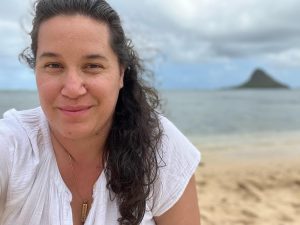 CERT-HIHH, Spring 2024
CERT-HIHH, Spring 2024
Kapi’olani Larin is Kanaka Maoli living on the continent in California. She is a License Marriage and Family therapist, Advanced Certified Clinical Trauma Specialist, and Historical Trauma Specialist with a special interest in bridging the gap between Western psychotherapy, Indigenous knowledge systems, and the application of Indigenous practices in a clinical setting.
Kapi’olani came to the Hawaiian and Indigenous Health and Healing program after a peer reconnected to her ancestral heritage and encouraged her to seek out elders within her community. Passionate about trauma recovery and social justice, Kapi’olani was captivated by Kumu Kau’i and her work at UHWO. After extensive pondering and pule, she was affirmed by her ancestors that the HIHH program was the path she needed to take. The program provided theoretical frameworks that were Western and Hawaiian as well as the operationalization of concepts with Indigenous communities. The unique programming offered a space to acknowledge the legacy of historical trauma for Hawaiians and develop relevant, modern support to mitigate the impacts of that legacy through community oriented conceptualization. The experiential coursework returned lost ancestral wisdom to Kapi’olani which restored the sense of cultural identity and sense of belonging. Aside from the real world benefits, Kapi’olani has created lasting connections with fellow haumāna (students) and her Kumu, whom she believes are situated to mentor her into the next phase of the future. The HIHH program has solidified Kapi’olani’s decision to pursue her doctorate degree with the aspiration to Indigenize mental healthcare through contemporizing graduate level mental health education and clinical practice. She affirms, “This program changed my life for the better.”
Kapi’olani is currently a staff therapist with UC Riverside’s Counseling and Psychological services as well as owning her own private practice, Ho’omau Counseling Services.
Kāhealani Rivera, BAS, LMT
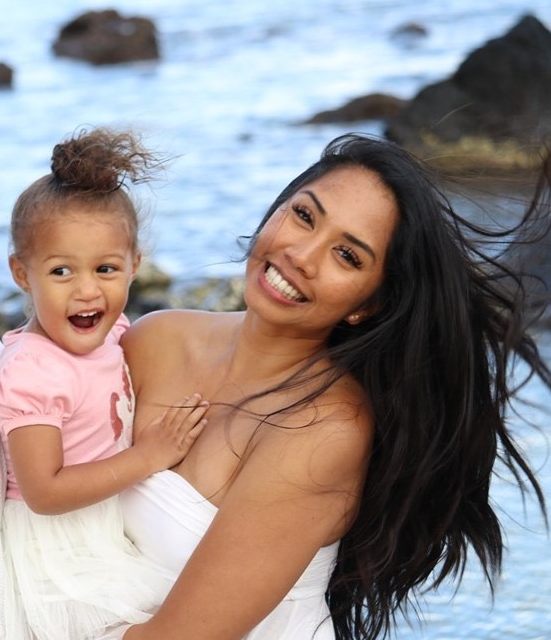 CERT-HIHH, Spring 2024
CERT-HIHH, Spring 2024
As a licensed massage therapist and traditionally trained Lomilomi practitioner, I feel the HIHH program has broadened my understanding of Native Hawaiian health. Through the program, I gained insight into the historical context of Native Hawaiian Health and the health inequities facing indigenous communities. The fusion of healing classes within an academic setting was a wonderful experience that helped me further connect with my cultural roots. The healing classes were grounded in Hawaiian values and reminiscent of traditional healing. It also provided a safe and nurturing space for self-reflection that supported personal and academic growth. Overall, the program has enhanced my professional expertise and fueled my personal journey of cultural rediscovery, shaping my commitment to advancing the well-being of our communities.
ʻIʻiwileohoʻoipoipoʻokalani K. Pacarro

BAS Hawaiian & Indigenous Health & Healing, BAS Sustainable Community Food Systems
ʻIʻiwileohoʻoipoipoʻokalani K. Pacarro is a graduate of the University of Hawaiʻi–West Oʻahu with a Bachelor of Applied Science in Hawaiian and Indigenous Health and Healing, and Sustainable Community Food Systems. As a lifelong apprentice to Aunty Lynette Paglinawan, they gained a deep understanding of Hoʻoponopono, traditional Hawaiian conflict resolution, and community healing practices, and are dedicated to continuing her legacy of fostering balance and well-being within the lāhui. Guided by the principle of aloha ʻāina, ʻIʻiwileo’s work focuses on reconnecting individuals to their roots through community education and cultural revitalization.
They will soon begin their Master’s studies at the University of Hawaiʻi at Mānoa, aspiring to develop programs that blend traditional knowledge with innovative approaches to empower communities. With a strong belief that education rooted in ʻike kūpuna is a pathway to resilience, sovereignty, and thriving futures, they aim to inspire others to embrace their identity and contribute to the well-being of ʻāina and people alike.
Kaumakaonalani Leleo

Kaumakaonalani Leleo was born and raised on the island of Oʻahu and currently resides in Mākaha. They pursued a degree in Applied Science with a concentration in Hawaiian, Indigenous Health, and Healing to deepen their understanding of using Native Hawaiian plants for medicine. They transferred to UH West Oʻahu from Leeward Community College in 2022 and graduated from the HIHH program in the Fall semester of 2024.
Through this program, they gained insight into the health disparities affecting Native Hawaiians and Pacific Islanders. The various classes provided opportunities for reflection and strengthened their connection to their roots. Overall, the program contributed to their personal and professional growth.
Following UH West Oʻahu, they plan to pursue a Master of Science in Counseling Psychology at Chaminade University of Honolulu, focusing on school counseling. Their goal is to support the next generation and help individuals grow.
Lindsey Millerd

I’ll be combining my passions for writing and wellness as a grant writer for Kokua Kalihi Valley. I’m excited to help support their important community programs ranging from their nature preserve to youth programs. I plan to pursue freelance journalism on the side, covering the local community, health and sustainability topics. After enjoying a kapa course during my last semester of college, I’m now continuing to practice kapa through a community class and plan to eventually sell some crafts alongside my current small business for vintage clothing and accessories. I enjoy gardening, with hopes to become more self-sufficient, and playing the bassoon in the West Oahu band.
My biggest passion is promoting health through social and environmental connection.
I’ve been hosting a run and walk club for west and central Oahu (@westsiderunnahz) and share health content through Instagram (@hihealthyliving). My long-term goal is to expand HI Healthy Living into a business and/or non-profit to share the work of local organizations and offer affordable health coaching services with a cultural and eco-conscious approach. My first goal is to start a website with a consolidated calendar of community service events and a map of farmer’s markets, campgrounds, and other outdoor activities to help simplify active living.